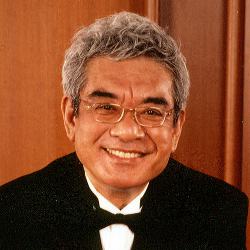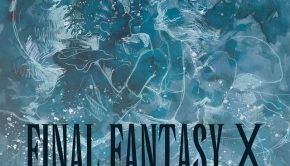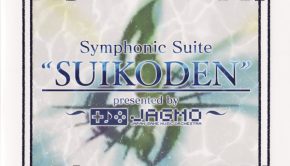Kentaro Haneda Obituary
 |
Also Known As: 羽田健太郎 (はねだけんたろう) / Haneken |
| Date of Birth: January 12, 1949 (Tokyo) |
|
| Date of Death: June 2, 2007 (Tokyo) |
|
| Game Works: Wizardry, Orchestral Game Concerts, Symphonic Suites |
|
| Official Site: Japanese Site |
History
| Organisation | Type | Tenure | Role |
| Freelance | N/A | 1973 – 2007 | Pianist, Composer, Arranger |
| Daimei no Nai Ongakukai 21 | Television Program | 2000 – 2007 | Host |
Biography
The late musical polyglot Kentaro Haneda has numerous credits to his name, as a classically-trained pianist and versatile composer alike. In the field of gaming, he famously scored the initial instalments of the Wizardry series, opened the first Orchestral Game Concert, and created symphonic albums dedicated to the Wizardry, Ys, and Sorcerian series. Born on January 12, 1949 in Tokyo, he was raised by his mother, a door-to-door salesperson, and his grandfather following the death of his father. He encountered music for the first time at the age of four, when he joined a youth choir. In the second year of primary school, Haneda started taking piano lessons and continued at an amateur level under several teachers until junior high school.
Haneda soon decided that he wanted to pursue a musical career and begun studying under notable pianist Kazugo Ariga. He came second place on the entrance exams for the entrance of the eminent Toho Gakuen High School after tirelessly practicing Czerny’s Etudes and his free performance piece, Schumann’s Novelletten. While there, he practiced the piano for 12 hours on each of his free days, culminating in him becoming the top student. After experience playing in hotel lounges and unsuccessfully taking part in the Japan Music Competition, he joined university in 1967 specialising in piano performance. In 1972, he took the third place in the 39th Japan Music Competition playing Beethoven’s Piano Concerto No. 4. The same year, he came top in the year in his graduation exams and had acquired the status of virtuoso. He intended a prolific and diverse career to follow.
Active since 1973, Haneda initially worked as a studio musician. He worked on many pop records, notably performing the piano on the early works of singer Machiko Watanabe before becoming her bandleader between 1978 and 1980. In 1978, Haneda made his debut as an anime composer on the Treasure Island series adapted from Robert Lewis Stevenson’s novel by director Osamu Dezaki. He was subsequently asked to score a range of works, spanning series such as Thunderbirds 2086, films such as Virus, and the popular mecha anime Space Warrior Baldios in the early 1980s. In 1982, he made a popular breakthrough with a dark and jazzy score to Space Adventure Cobra and the symphonic accompaniment to Robotech: The Macross Saga.
In his mid-30s, Haneda focused once more on classical performance. With the NHK Symphony Orchestra, he performed Richard Strauss’ Burlesque and subsequently appeared on several occasions with various Japanese professional orchestras. In great demand both as a studio artist and live performer, the pianist was praised for his technical rigour and expressive interpretations alike. He continued to balance such endeavours with roles as an anime composer with his award-winning multi-part soundtrack to Super Dimension Fortress Macross thereafter, Haneda was able to reflect the bridge between the personal and the epic. His other successes during this period included Barefoot Gen, God Mazinger, Detective Holmes, Super Dimension Century Orguss, Bagi, the Monster of Mighty Nature, and Bye Bye Jupiter, which cemented his position at the centre of the industry.
Haneda’s first game was creating the music for the Japan version of Wizardry: Proving Grounds of the Mad Overlord. Originally a text-based American RPG by Sir-Tech, the acclaimed game was significantly fleshed out by ASCII for its initial 1985 Japanese release on early computers. Opening with an epic overture, light-hearted works dominated the score, while moody dungeon themes and a vivacious battle theme added to its diversity. The result was a classically rigorous, often Baroque- and renaissance-influenced, score with a distinct character. Haneda adopted similar formats for the subsequent scores in the original trilogy and ensured that, despite their computer’s superficial sound chip and limited number of channels, each of his compositions were memorable and emotional.
In 1987, influenced by the success of Koichi Sugiyama’s Dragon Quest Suite, Haneda arranged his score for Wizardry into an orchestral suite. Due to budget limitations, he synthesized the album rather than conducted a live orchestra, but the musicality of the album was still exceptional. Its success inspired suites for third and, later, second Wizardry games, once again entirely Haneda’s work. Inspired by the quality of the Wizardry suites, Falcom hired Haneda to produce symphonic arranged albums of the scores for the PC-8801 RPGs Ys and Sorcerian. He emphasised the melodies of each score,while adding drama to them through lavish orchestrations in a variety of styles. Uniquely, each album was arranged into four movements like a symphony and combined several tracks from the game in a medley-like format so that each told a story.
In 1993, Haneda opened the first of Japan’s Orchestral Game Concerts conducting performances of Wizardry’s “Opening Theme” and Wizardry III’s “Adventures Inn” from the Tokyo City Philharmonic Orchestra. The composer inspired this historic concert with Koichi Sugiyama and Yoko Kanno and its success inspired four yearly successors. While Haneda only contributed to the two initial instalments to the series — conducting Wizardry V’s “Opening Theme” for orchestra and piano for the second — his lush arrangements were unforgettable. He also went on to produce elaborate and extensive scores for Wizardry V, Wizardry VI, and Wizardry: Llylgamyn Saga. Due to other commitments, he placed Tamiya Terashima in charge of their orchestral albums, but not at the drop of musical quality. Haneda’s mature scores have continued to influence other musicians that have taken the series’ helm.
Still a successful pianist, Haneda developed a sizeable classical repertoire in the 90s with albums dedicated to Mozart, Tchaikovsky, Gershwin. Having become a well-known Japanese artist, he was able to release numerous albums dedicated to the Beatles, Disney, the Christmas season, and Japanese poetry to commercial success, as well as an eight-part series of ’musical method’ titles. Despite such successes, Haneda suffered from alcoholism from 1998. As a consequence of drinking consistently from morning to evening, he developed some health problems that required him to admitted to hospital in December. While there, he entered a coma for a week and required intensive care after developing Acute Hepatitis. After leaving hospital, Haneda stopped drinking altogether and began to make a short-term recovery from his liver damage.
From April 2000 until the month before his death, he presented the long-running Japanese TV Asahi show Daimei no Nai Ongakukai 21 (literally The Untitled Concert 21). Broadcast every Sunday morning with the intention of entertaining as wide an audience as possible, Haneda endeared to many people with his warm and humorous style. He was also invited to lecture at the Tokyo College of Music. In his last monumental performances, he performed Ravel’s Piano Concerto, Gershwin’s Rhapsody in Blue, and, in a later event, Rachmaninoff’s Piano Concerto No. 2 with the Moscow Symphony Orchestra. Closing his involvement in video games, Kentaro Haneda directed the production of classically-oriented albums dedicated to Tokimeki Memorial 3 and the Suikoden trilogy in 2001. Several years later, his work on the Wizardry series was commemorated with a box set.
Several years before his death, physical weakness inspired him to reinvent himself as a conductor, but he planned a concert to celebrate his 35th year as a professional musician. Unfortunately, it was postponed as he was diagnosed with liver cancer and eventually hospitalised. On June 2, 2007 at 11:53 PM, Kentaro Haneda died at the Tokyo Shinjuku Hospital leaving his wife Sachiko. Japan mourned the loss of one of their most prominent musical figures and the news has also saddened many video game and anime fans in the West. His contributions to game music were secondary to his achievements as a pianist, conductor, anime composer, and TV host. Given how memorable and historically significant his game music works were, this is a testament to the breadth and eminence of his career.
References:
– Various Game & Album Credits
– VGMdb Discography
– Official Site (Japanese, Archived)
© Biography by Chris Greening (September 2007). Last update on December 30, 2012. Do not republish without formal permission.
Posted on December 30, 2012 by Chris Greening. Last modified on March 21, 2014.














